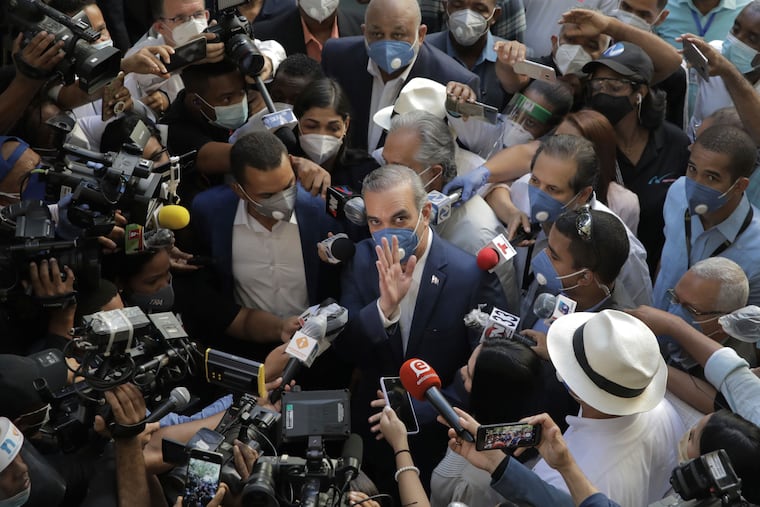The Dominican Republic has a new president. Philly Dominicans reflect on Luis Abinader’s election and challenges.
Abinader's swearing-in ceremony was attended by diplomatic officials from Haiti, Spain, Turkey, Honduras, and Guatemala. U.S. Secretary of State Mike Pompeo also attended.

On Sunday, Dominicans around the globe celebrated Restoration Day with a new president officially taking office.
Luis Abinader, a 53-year-old economist and businessman of Lebanese descent, won a four-year term on July 5, ending a 16-year administration by the Dominican Liberation Party. He had run for office in 2016, finishing second in the presidential race. This year, he became the first Latin American president elected during the coronavirus pandemic and the first sworn into office after recovering from COVID-19.
The Dominican president’s weekend inauguration ceremony was attended by diplomats from around the world, including representatives from Haiti, Spain and the European Union, Turkey, Serbia, Honduras, Guinea-Bissau, and Guatemala. U.S. Secretary of State Mike Pompeo also attended.
In his speech, Abinader acknowledged the financial and emotional support that Dominican diasporas have provided to the islanders during the pandemic. He also spoke about the challenges the country faces with the new school year set to start Monday and the recovery of the nation and its economy, where the coronavirus has caused more than 1,450 deaths and prompted business shutdowns. A nighttime curfew remains in place.
The new Dominican president, who paid Rudy Giuliani for consulting services during his campaign, promised the nation he wouldn’t practice borrón y cuenta nueva (a clean slate), and committed to pursue past government corruption cases and investigate any new claims of corruption.
The Inquirer spoke with three Philadelphia Dominicans about Abinader’s election and their views on what lies ahead for his presidency:
Rafael Logroño, 26, is an adjunct professor at Temple University who teaches Latin American media studies. He thought watching Abinader’s swearing-in Sunday was a great transition to watching the Democratic National Convention because of the sense of optimism that came with the new Dominican administration.
As a Philly-born Dominican who hasn’t claimed his rights to the Caribbean country’s citizenship, he said, he saw many Dominicans in Philadelphia voting in July with “the last sense of faith that they had.” That included his parents, who voted for the first time since moving to the United States 30 years ago.
“He honored the Dominican population in the United States and around the globe, and that was great because, in the end, the welfare of the country impacts us abroad as well,” Logroño said, referring to the financial assistance Dominicans send back to family members and friends.
According to the Dominican Central Bank, the Dominican Republic has received a total of $3.4 billion in remittances during the first six months of 2020 from Dominicans living overseas.
Logroño did lament that Abinader didn’t address gender and race equality.
Brunilda González, 56, has owned a grocery store at Seventh and Master Streets for 27 years. She said she is looking forward to watching Abinader’s speech again, saying it “brought peace to her soul.”
“That man was so precise and so humble, that it felt like the perfect energy for the pandemic,” she said.
González said the Dominican nation needed a person with fresh ideals, who would work for the collective interest and not one particular group. She hopes he delivers a presidency that unites Dominicans wherever they live.
State Rep. Danilo Burgos helped facilitate the Dominican voting efforts last month in areas across Pennsylvania with large populations of Dominicans, such as Philadelphia, Allentown, Reading, and Hazleton.
He said Dominicans should wait and see what the new president’s administration accomplishes.
Burgos said Giuliani’s record as the U.S. attorney for the Southern District of New York suggests the type of anti-corruption programs that he might have shared with Abinader as his adviser. But he remains skeptical regarding future outcomes because of Giuliani’s influence and connection to the Trump administration, which has been marred by anti-immigrant policies and rhetoric and involvement in Latin America’s welfare and stability.
“Giuliani has also been an adviser to the administration that has had the most criminal indictments in U.S. history, so this doesn’t sit right.”